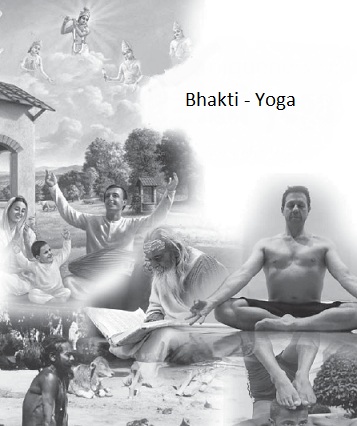
Out of the many bona fide spiritual practices, or the paths toward God realization, four are considered most prominent: karma-yoga, or the sacrifice of the fruits of one’s work; jnana -yoga, or the analytical study of matter and spirit; astanga-yoga, or the meditation on the partial representation of God within oneself; and bhaktiyoga, or the path of surrender and devotion to God. The first three processes demand extraordinary determination and strength on the part of the practitioner. Karma-yogis must be totally detached from the fruits of their work, otherwise they will be bound by the reactions of their karma. jnana -yogis must undergo rigorous study of Vedic scriptures, and astanga-yogis must have complete control over their mind and senses. Even a small mistake on the part of the yogi can undo his achievements, forcing him to undertake the practice all over again.
Bhakti-yoga, on the other hand, is unique because the practitioner doesn’t depend on his or her abilities alone to advance spiritually. As bhaktiyogis, we seek to draw strength from the source of all strength, Lord Krishna , by total heartfelt dependence. All our efforts in our spiritual practises are to attract this grace of the Lord, which alone can help us sustain our spiritual life.
For example, consider the problem of dealing with the enemy of lust. An astanga-yogi will concentrate on certain yogasanas and try to overcome this problem on the strength of his yogic practises. A jnani, or a philosopher or an empiricist, would study the scriptures deeply and develop renunciation of the world and its pleasures.
A bhakti-yogi, however, while practising the discipline of a regulated lifestyle and doing the needful, increases his internal dependence on Krishna . He offers prayers to the Supreme Lord and to the Lord’s devotees who have overcome this terrible foe of lust that threatens every sincere spiritualist. A bhakti-yogi, or a devotee, knows that all his strength to practise spiritual principles comes from the Lord. Thus humility is natural reward on the path of bhakti, whereas through karma, jnana or astanga, an aspirant runs the risk of getting distracted by his own spiritual prowess.
One of the prominent devotee scholars in our Gaudiya Vaisnava tradition is Srila Baladeva Vidyabhusana, who was challenged to write a commentary on the Vedanta-sutra. He had the serious responsibility to uphold the sanctity and credibility of his tradition. He didn’t begin writing with the passion of a man out to prove his detractors wrong. No, he was humble. He spent days and nights praying to his dear Lord Sri Govindadeva, and upon receiving divine inspiration wrote his commentary known as Govinda-bhasya. This work was appreciated by all the spiritual leaders of the time. Without getting carried away by this glory, Baladeva gave all credit of his writing to his own spiritual master, Srila Visvanatha Cakravarti Thakura whose blessings empowered him to write this work.
Srila Prabhupada too echoes this mood of helplessness and dependence. Feeling tiny and insignificant on the cargo carrier Jaladuta that took him to America, he offered heartfelt prayers to Lord Krishna and his spiritual master, Srila Bhaktisiddhanta Sarasvati thakura, to empower him to spread the message of Krishna consciousness. And later when he attained overwhelming success, he remained equally humble without becoming falsely proud: he immediately gave the credit for his success to his own disciples, and said they had been sent to him by his spiritual master in order to help him spread Lord Caitanya’s mission all over the world.
This dependence on Krishna ’s mercy not only keeps a devotee humble, it also helps him come closer to Krishna . A devotee, in this mood of sincere prayer, develops a soft heart, imbued with rich emotions for Krishna . These emotions give rasa, or a taste to sustain devotional practices.
Bhakti-yoga thus offers a rich reward of a taste of personal, loving relationship with the Supreme Personality of Godhead, Lord Krishna . One can feel the reciprocation from Krishna ; one feels loved by the all-loving Krishna .
Vraja Bihari Dasa holds a postgraduate degree in International Finance and an MBA from Mumbai University. He is serving as a resident monk at ISKCON Chowpatty. He is an active teacher of bhakti-yoga and a prolific writer on Krishna consciousness. You can read his daily reflections on www.yogaformodernage.com
